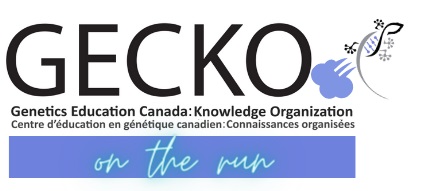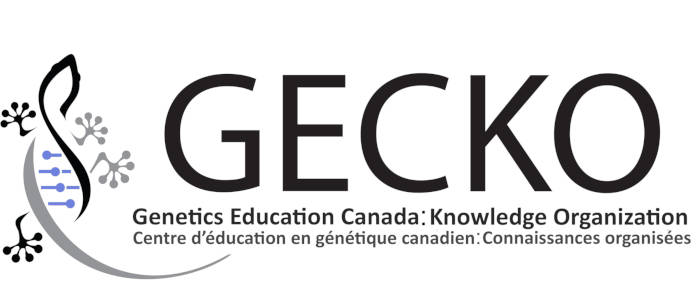
Download the PDF here. For point of care tools to facilitate ordering of first-tier genetic testing in your province, see here. For a comprehensive overview of neurodevelopmental disorders and genetics, see the GECKO deep dive here. [May 2024]
|
Bottom line: Neurodevelopmental disorders (NDDs) are a group of conditions which include autism, global developmental delay (GDD) and intellectual disability (ID), as well as attention deficit hyperactivity disorder (ADHD), specific learning disorders (LD), and others. An NDD may have a genetic cause, such as a genetic syndrome, or complex inheritance with genetic susceptibility factors. An identifiable genetic etiology is more likely in those with co-occurring health conditions or those who have a family history of NDDs. Genetic testing is indicated for all:
Genetic testing is not indicated for those with isolated ADHD, LD, speech delay or other isolated NDD. The Canadian College of Medical Geneticists 2023 Position Statement recommends first-tier genetic testing be organized by non-genetics clinicians before or concurrent with a referral to genetics. This includes chromosomal microarray and, in some cases, Fragile X syndrome testing. Identifying the genetic etiology of an NDD may provide answers for families, inform recurrence risk and medical management. Individuals with a positive result on first-tier testing benefit from referral to a genetics specialist. Negative first-tier genetic testing does not rule out the possibility of a genetic contribution and referral to a genetics specialist for consideration of second-tier testing is recommended, unless the indication for testing was isolated autism. Genetic testing may yield uncertain or unexpected results, in which case a referral to a genetics specialist would be recommended. Periodic reassessment and possible re-referral to Genetics is suggested when no genetic etiology is identified using current testing approaches. |
What are neurodevelopmental disorders (NDDs)?
NDDs are conditions that impact the development and function of the brain leading to general or specific impairments of intellectual, motor, language, and/or social skills or abilities. Onset is early in childhood development and impairments can continue throughout life. NDDs include autism, intellectual disability (ID) and global developmental delay (GDD), attention deficit hyperactivity disorder (ADHD), communication disorders, specific learning disorders, and motor and tic disorders.
What causes NDDs?
Once an NDD diagnosis has been established, an etiological diagnosis can be explored.
Autism: The etiology of autism is typically thought to be multifactorial. Genetic and non-genetic (i.e. environmental) susceptibility factors and their interactions contribute in an additive way to the likelihood of an individual being autistic. Some genetic susceptibility factors confer a high chance of autism, while others confer a lower or moderate chance. A genetic susceptibility factor may not be specific to autism and may also predispose to other NDDs. Environmental factors can contribute varying levels of susceptibility, but overall contribute less to autism than genetic factors.
Less commonly, autism can be a feature of a genetic syndrome. This is when autism is accompanied by a distinctive pattern of co-occurring health, behavioural, learning, and/or physical features. Examples include Fragile X syndrome, Rett syndrome, and Cowden syndrome.
Genetic variants associated with autism susceptibility can be inherited from a parent or can be de novo (a genetic variant occurring for the first time in an individual that has not been present in previous generations).
Global developmental delay and intellectual disability (GDD/ID): There are many possible causes of GDD/ID, including: genetic conditions, central nervous system malformations, illness/infection, prenatal exposure to teratogens, complications at birth, etc. There are numerous genetic etiologies, some associated with additional features (syndromic) and some not. Genetic variants associated with GDD/ID could be inherited from a parent or could be de novo. Some genetic variants may be sufficient in isolation to cause GDD/ID whereas others may act as susceptibility factors in a multifactorial inheritance model.
Other Neurodevelopmental Disorders: Many NDDs likely have genomic contributions. However, there is limited evidence regarding the likelihood of a genetic diagnosis for isolated NDDs other than autism, GDD and/or ID.
Who may benefit from a genetic assessment?
If an individual has clinical features suggestive of a specific genetic condition such as Rett syndrome, referral to a genetics specialist is suggested for evaluation and consideration of targeted genetic testing.
As the demand for genetic consultation is high and the wait time can be long, the Canadian College of Medical Geneticists (CCMG) recommends that, prior to a request for a genetic assessment for an individual with an NDD, the primary care practitioner or the most responsible healthcare practitioner offers and orders first-tier genetic testing.
Referral for a genetic assessment with first-tier genetic test results (positive, negative, uncertain or unexpected) is recommended unless the only indication for testing was isolated autism and the results were negative. Consider periodic reassessment when no genetic etiology is identified as genetic technology and genomic knowledge evolve.
In Manitoba, Newfoundland and Labrador, and Saskatchewan, first-tier genetic testing cannot currently be ordered by primary care clinicians. Referral to Genetics or Developmental Pediatrician for assessment is required.
Who to consider for first-tier genetic testing?
The goals of genetic testing are to investigate the underlying etiology of an existing diagnosis, inform medical care and prognosis, provide recurrence risk and inheritance information, and identify support resources. Genetic testing will not confirm or refute an established NDD diagnosis.
The Canadian College of Medical Geneticists (CCMG) 2023 Position Statement recommends that genetic testing be offered to all:
- autistic individuals.
- individuals with unexplained GDD and/or ID (regardless of severity).
- individuals with other NDDs plus syndromic features.
- Syndromic features may include dysmorphic features, congenital malformations, unexplained growth abnormalities, medical co-morbidities, or features of a metabolic condition. More details can be found in the GECKO deep dive. Resources for clinicians> Neurogenomics> Neurodevelopmental conditions
Genetic testing is not recommended for those with isolated NDDs other than autism, GDD, or ID.
What are first-tier genetic tests for NDD?
First-tier genetic tests for the indications above are chromosomal microarray and, in some cases, Fragile X syndrome.
Chromosomal microarray (CMA): CMA detects tiny gains and losses in the amount of chromosomal material. The types of variations detected by CMA include copy number variants (CNVs, variation in the number of copies of a specific segment of DNA, a micro-deletion or micro-duplication) and most aneuploidies (extra or missing whole chromosomes). CMA has a higher diagnostic yield than a karyotype for individuals with GDD/ID and autism and is thus the preferred genetic test.
Fragile X syndrome (FXS) testing: FXS is an X-linked condition caused by expansion of a repetitive nucleotide sequence in the FMR1 gene resulting in silencing of the gene. FXS can affect individuals regardless of sex assigned at birth, although the clinical presentation in those assigned female at birth is highly variable. As per CCMG statement, consider offering FXS testing to individuals with a diagnosis of autism, GDD and/or ID AND one or more of the following features:
- Macro-orchidism
- Relative or mild macrocephaly
- Large or prominent ears, long or narrow face, tall forehead, high arched palate, prominent jaw
- Soft velvety hands, redundant skin on dorsum of hands, hyperextensible joints, pes planus, mitral valve prolapse
- Autistic features, hyperactivity, shyness, gaze avoidance, hand biting, tactile defensiveness, anxiety
- Maternal relatives with a diagnosis of autism, GDD and/or ID
- Maternal relatives assigned female at birth with premature menopause or ovarian insufficiency
- Maternal relatives with adult-onset tremor, ataxia, or parkinsonism
- Maternal relatives with a known diagnosis of FXS or FXS related condition
Metabolic/biochemical testing: Inherited metabolic conditions associated with NDDs are individually rare. Most individuals will have additional suggestive features. Biochemical screening is only suggested for those with ‘red flags’ for these conditions such as developmental regression/plateau, abnormal neurological exam, intractable seizures, organomegaly, and/or movement disorders. Consider urgent referral to a metabolic/genetic specialist if a metabolic condition is suspected.
Second-tier genetic tests: In the absence of a positive result on first-tier testing, a geneticist may offer additional testing such as a multigene panel or exome sequencing (ES) following a thorough assessment.
How is genetic testing for NDD arranged?
GECKO point of care tools are available to facilitate discussion of genetic testing and explain how to order genetic testing, including links to laboratories and requisitions across Canada.
- Patient meets eligibility criteria.
- Patient accepts testing after value-based discussion weighing benefits and considerations.
- Download and complete the Requisition of the regional/provincial laboratory to order CMA.
- Complete with as much information as possible, checking all applicable boxes, and include available family history (even if non-contributory). The laboratory scientists will use all available clinical information to interpret results.
- Consider making a plan with your patient about how results will be disclosed e.g. by phone, an in-person appointment.
- Genetic test results can take 4-8 weeks, depending on the laboratory. If results could affect an ongoing pregnancy, you can request that they are expedited.
- Determine if FXS testing should also be offered and coordinate the blood draws with the appropriate requisition.
*Referral to Genetics or Developmental Pediatrician for assessment is required for clinicians in Manitoba, Newfoundland and Labrador, and Saskatchewan.
The first-tier tests are typically performed by hospital-based genetics laboratories. CMA is a cytogenetic test and FXS is a molecular genetic test. One requisition is usually required for each test as testing will be performed in separate laboratories.
If a blood draw is anticipated to be challenging, many online resources are published to assist parents and practitioners in preparing, such as:
- Autism Speaks https://www.autismspeaks.org/tool-kit/providers-guide-blood-draws
- Surrey Place https://www.surreyplace.ca/resources/blood-draw-toolkit/
What are the benefits and considerations of genetic testing for NDDs?
The likelihood of identifying a genetic cause depends on the indication for testing, whether an individual has any co-occurring health conditions, and/or any family history of NDDs.
Benefits
A positive test result (pathogenic or likely pathogenic variant) leading to a genetic diagnosis may:
- provide a causal explanation for the NDD diagnosis. For some, this may relieve parental guilt and/or promote acceptance of an NDD diagnosis.
- aid in preparing for an individual’s future care and needs.
- inform medical care in a small subset of individuals. For example, by facilitating targeted surveillance for other medical conditions (e.g. cancer) known to be associated with the genetic diagnosis.
- provide information about inheritance and recurrence risk.
- allow identification of condition-specific support resources for individuals and families.
Considerations
- Learning about genetic testing results can be emotionally challenging.
- An uninformative result may be disappointing or frustrating.
- Unclear or unexpected results are possible and may be distressing.
- An identified inherited cause may produce feelings of parental guilt.
- Some individuals worry about stigma associated with a genetic diagnosis.
- Due to limitations in current genomic knowledge and technology, a negative result does not rule out a genetic contribution, or the possibility of having another child with an NDD.
- Result may not inform prognosis/medical management even if a genetic explanation is found.
- Information discovered may have implications for the health of relatives.
- In the past, genetic results could have impacted one’s ability to obtain life, long-term care, or disability insurance. Today, in Canada, a Genetic Non-Discrimination law protects Canadians and their genomic information from discrimination.
Authors: C Aldridge, MS CGC, S Morrison MS CGC, JE Allanson MD FRCPC FCCMG, S Walji MD CCFP MPH and JC Carroll MD CCFP


